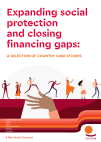|
|
|
|
|
|
| |
|
| |
|
| |
|
| |
Expanding social protection and closing financing gaps |
| |
|
| |
 |
A selection of country case studies: Bangladesh, Gabon, Honduras, Mongolia, Senegal and Somalia
This report contributes to the ongoing debates on the establishment of universal social protection through an analysis of eight specific country cases where trade unions are actively campaigning for extending social protection as part of national development strategies. This report showcases the national social protection needs of these countries, existing social protection coverage and financing gaps, as well as the existing contribution of official development assistance (ODA) towards social protection in the different countries concerned.
The cases showcase the potential for mobilising greater domestic resources for social protection as well as the importance of greater international financial support towards social protection, including strengthening the share of development assistance towards social protection to at least 7% of existing ODA allocations in the short term, as well as the potential for a Global Social Protection Fund in mobilizing and coordinating international financing to make social protection a reality for all.
The report is available in English, French and Spanish. This study was prepared by the ITUC, with financial support from WSM. Read more |
| |
|
| |
|
| |
New Forms of Social Insurance: The Case of the FIWON Cooperative Scheme in Nigeria |
| |
|
| |
By Temilade Sesan
The Nigerian government’s response to the vulnerabilities of workers in the informal sector has been slow. While progress has been made in the laying of institutional frameworks and the introduction of social protection programmes over the past decade, with coverage at just six per cent of workers in the country, these fall far short of the need.
The low levels of public investment in social protection in Nigeria reflect a general crisis of governance, one in which government priorities are informed largely by political considerations that do not align with the interests of informal workers.
The FIWON cooperative, a wholly informal worker-driven collective with chapters in Lagos and Osun, facilitates access to insurance for its members. The findings from the case study could be useful to others in contexts where public trust has been significantly eroded and government investment in social protection is low. Read more |
| |
|
| |
|
| |
The Decoding Injustice Tools Hub |
| |
|
| |
CESR’s launched a new digital space in which they offer a powerful way for activists, campaigners, and communities around the world to use research to advance economic, environmental, and social justice.
Injustices like gender inequality, the climate crisis, racial discrimination, labor abuse, are enabled and exacerbated by economic policies. CESR’s Tools Hub offers the essentials for creating evidence that shows to what extent and by what means rights are being violated. By shedding new light on how economic policies harm people’s human rights, Decoding Injustice supports our demands for those in power to live up to their promises and right the wrongs of historic oppression. Read more |
| |
|
| |
|
| |
Webinar: From gender-responsibe to gender-transformative public services |
| |
|
| |
 |
Public services as a tool to promote gender equality. 23 June 2022, 1:30 pm UTC
The escalating global environmental and inequalities crises, compounded by the effects of the COVID-19 pandemic, have further exposed and exacerbated the existing gender inequalities and have added to the factors that put women’s human rights at risk.
In the face of these structural and emerging challenges, public services can play a decisive role in the transformation of the asymmetrical and unjust power relations between women and men.
Panel 1: Challenges and risks: what are the key barriers to the development of gender- transformative public services?
Panel 2: Solutions and opportunities: how would gender-transformative public services look like in practice? What are the key components of a gender-transformative agenda for public services?
The side event is co-organized by Public Services International (PSI), Global Initiative for Economic, Social and Cultural Rights and Global Alliance for Tax Justice during the 50th session of the Human Rights Council. Registrations |
| |
|
| |
|
| |
|
|
|
|
|
|


